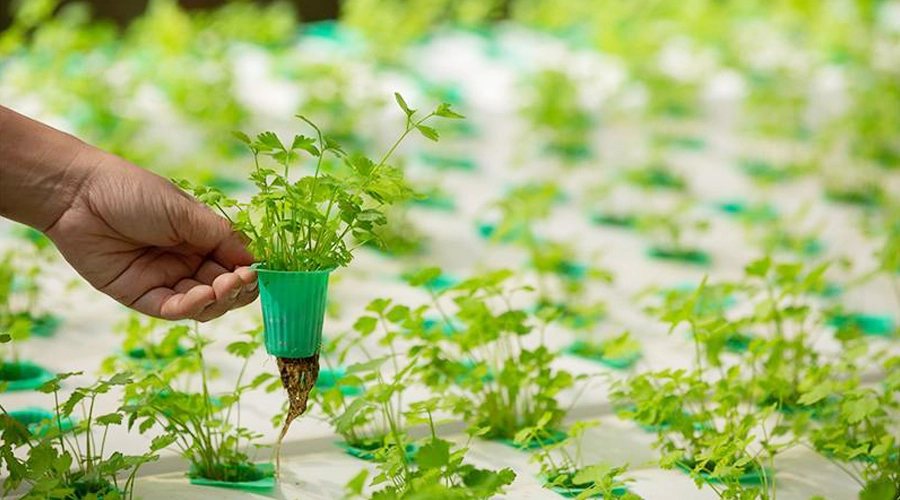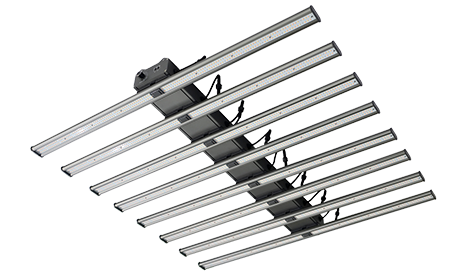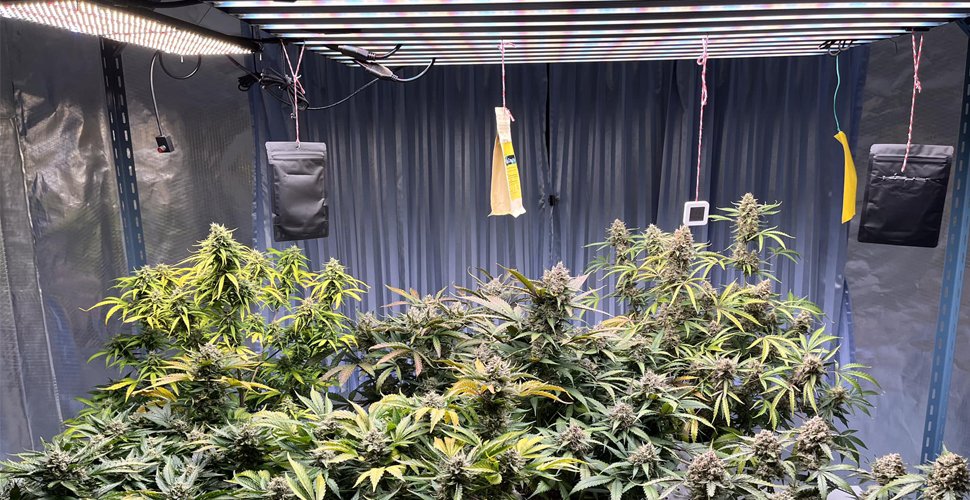När du kommer in i hydroponikens värld är detta ett trädgårdsunderverk där jorden tar ett baksäte och växter frossar i vattnets symfoni. I denna unika odlingsmetod är vatten inte bara ett medium; det är livsnerven i oasen.
En odlare har ställt en intressant fråga: Kan växter växa bättre med mineralvatten än kranvatten?
Det är en frestande idé som kräver utforskning - är mineralvatten en potentiell katalysator för rotkaos, eller är det en hemlig formel för frodig lummig tillväxt? Fortsätt läsa när vi tillsammans går in i svaren!
Förstå mineralvatten
Innan vi går in i användningen av mineralvatten i hydroponics, låt oss först förstå definition och sammansättning av mineralvatten.
Mineralvattnet som avses här är inte din vanliga kolsyrade dryck; den kommer från underjordiska reservoarer och innehåller naturligt mineraler som kalcium, magnesium och kalium.
Dessa mineraler är inte bara etiketter på vatten på flaska; de spelar avgörande roller i växternas tillväxt. Till exempel stärker kalcium cellväggarna och hjälper till med näringsupptaget. Magnesium främjar fotosyntes och enzymfunktioner. Kalium reglerar vattenbalansen och upprätthåller lövens vitalitet. Natrium bidrar till näringstransport och stresstålighet.
Vid första inspektionen kan det tyckas att tillsats av mirakulöst mineralvatten till ett hydroponiskt system kommer att leda till frodig växttillväxt. Men i hydroponikens rike är exakt näringstillförsel nyckeln.
Innan vi släpper lös vår entusiasm, låt oss noggrant undersöka de potentiella fördelarna och fallgroparna med denna glittrande hydreringsstrategi.
Fördelar med att använda mineralvatten
Mineraler för näringstillgänglighet
Kalcium: Detta avgörande mineral står i centrum, stärker cellväggarna och säkerställer strukturell integritet. Den tillåter selektivt specifika typer av molekyler att komma in.
Magnesium: Den deltar i många växtprocesser, inklusive fotosyntes, energiproduktion och proteinsyntes. Med magnesium trivs växter, växer kraftigt och frodigt med lövverk.
Kalium: I mineralvatten spelar kalium en avgörande roll för att främja rotutveckling, förbättra vattenabsorptionseffektiviteten och stärka växternas övergripande sjukdoms- och stressresistens.
Mineralvatten hjälper till att stabilisera pH
Upprätthålla den perfekta balansen mellan surhet och alkalinitet i en hydroponiskt system är som att gå på en lina med ögonbindel – ett litet felsteg och växter kan störta ner i avgrunden av surhet eller alkalinitet.
Salterna som finns naturligt i mineralvatten kan fungera som buffertar och absorbera överskott av vätejoner (sura ämnen) eller hydroxidjoner (alkaliska ämnen). Tänk på dem som små svampar, som suger upp oönskade gäster och håller surheten och alkaliniteten inom tillfredsställande intervall.
Mineralvattens buffertkapacitet är dock en kortsiktig lösning. Precis som en svamp så småningom mättas kan mineralvattens buffertkapacitet förbrukas, särskilt i situationer där mineralinnehållet är instabilt eller obalanserat.
Att enbart förlita sig på mineralvatten för att kontrollera pH kan dessutom maskera underliggande problem i systemet, såsom näringsbrist eller utrustningsfel.
Att använda mineralvatten som pH-buffert är därför en tillfällig åtgärd snarare än en långsiktig lösning. Regelbunden övervakning med pH-mätare och justeringar med dedikerade pH-kontrolllösningar är avgörande för att bibehålla stabila förhållanden.
Mineralvatten är lättillgängligt
Du behöver inte längre vänta på brummandet från filtret för omvänd osmos eller oroa dig för att regntunnor ska svämma över – mineralvatten är som en vattenstation på begäran.
Utan invecklade inställningar och inga komplexa filtreringssystem att lära sig och älska, antar mineralvatten en “plug-and-play” förhållningssätt till hydroponics.
Beroende på din geografiska plats och vattenkällor kan mineralvatten bli den kostnadseffektiva hjälten i hydroponikens värld.
Potentiella utmaningar
Okontrollerat mineralkaos: De varierande mineralsammansättningarna av olika märken och satser gör det utmanande att kontrollera näringsbalansen. Detta kan resultera i näringsbrist eller ackumulering av giftiga ämnen, vilket i slutändan hindrar växternas tillväxt och äventyrar deras hälsa.
pH obalans: Mineralvattens pH är vanligtvis högre än det idealiska pH-värdet för växter, vilket kräver ytterligare justeringar och lägger till ytterligare ett lager av komplexitet till ditt hydroponiska arbete.
Saltstress: Mineralvatten innehåller höga halter av natrium, klorid eller andra mineraler, och dessa ämnen kan ackumuleras i ditt system. Detta kan hindra växttillväxt, minska avkastningen och till och med leda till växtdöd.
Igensättning och korrosion: Även om vissa mineraler kan gynna växter, kan de skada rören och utrustningen. Med tiden kan de ackumuleras, täppa till droppledningar och orsaka korrosion av metallkomponenter, vilket leder till systemläckor och funktionsfel.
Kompatibilitet: Växter varierar i sin tolerans mot mineralvatten. Vissa, liksom sallad och örter, kan anpassa sig relativt väl till inkonsekvent vattenkvalitet. Däremot är tomater och jordgubbar mer mottagliga för obalanser och stress orsakad av mineralvatten.
Testa och justera hydroponiskt mineralvatten
Att använda mineralvatten i hydrokultur kan verka bekvämt, men jämfört med dedikerade vattenkällor kräver mineralvattens oförutsägbara mineralsammansättning ytterligare övervakning och justeringar.
Steg 1: Testning
pH-mätare: Den första försvarslinjen mot pH-obalans. Mät pH-värdet för mineralvatten och jämför det med det idealiska intervallet för växter (vanligtvis 5,5-6,5).
Totalt lösta fasta ämnen (TDS)-mätare: Ger omfattande insikt i mineralinnehåll. TDS bör vara runt 200-300 ppm för att undvika saltstress.
Individuella näringstestsatser: Testa specifika mineraler som kalcium, magnesium och kalium för att finjustera din förståelse av mineralcocktailen.
Steg 2: Justering
pH upp/ner lösningar: Dessa lösningar kan justera vattnets pH. Använd dem försiktigt, lägg till i små mängder och testa igen för att undvika att överskrida målvärdet.
Näringstillskott: Om mineralvatten saknar viktiga näringsämnen, tillsätt näringsämnen baserat på växtens behov och önskat målområde.
Utspädning: I vissa fall kan utspädning av mineralvatten med andra vattenkällor (som vatten med omvänd osmos) hjälpa till att minska det totala mineralinnehållet, vilket minimerar saltstress.
Tips
Börja smått: När du justerar pH eller tillsätter näringsämnen, börja med små mängder och öka gradvis baserat på mätresultat.
Konsekvens är nyckeln: Regelbundna tester och justeringar är avgörande för att upprätthålla en stabil miljö för växter. Övervaka pH- och TDS-värden minst en gång i veckan och justera näringsnivåerna efter behov.
Lär känna dina växter: Olika växter har olika näringsbehov och toleranser mot mineralvatten. Forskning för att förstå dina växters specifika behov.
Överväg alternativ: Även om mineralvatten är bekvämt, bör det inte vara ditt enda beroende. Utforska alternativa vattenkällor för hydrokultur.
Jayes
Som Digital Marketing Manager på AUXGROW kombinerar Jayes en passion för hydroponiska system och expertis inom LED-odlingslampor. Med praktisk erfarenhet och en djup förståelse guidar Jayes dig genom en värld av hållbar odling.





